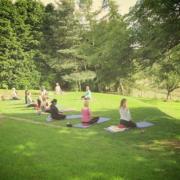Richard Grogan, a consultant and orthopaedic surgeon at The Yorkshire Hip and Knee Clinic, shares his top tips to help you recover from hip or knee surgery.
Alongside specialist consultants, Chris Brew and James Hahnel, they provide one-to-one, dedicated care at The Yorkshire Clinic in Bingley, Nuffield Health Hospital and Spire Roundhay in Leeds, designed to help you combat joint pain and return to an active life as soon as possible.

Q: Why go swimming after hip or knee surgery?
A: Swimming isn’t as demanding on the joints as other forms of exercise, like jogging or hiking, so is great for those recovering from hip or knee surgery.
The buoyancy of the water takes the weight off your joints, making it easier for you to move and flex. Swimming is also an effective form of cardiovascular exercise and engages the whole body so can help you stay fit and active.
Even if you’re not a strong swimmer, I recommend trying out other water-based exercises such as reduced weight-bearing activities or aqua aerobics. Swimming is one of the first sports I recommend my patients try following surgery, as it can ease pain and swelling, make recovery exercises simple and enjoyable, and improve range of movement in your joints.
Q: How soon after hip or knee surgery can I go swimming?
A: Every patient is different, and so recovery times can vary. I always advise my patients to listen to their body, and never to push themselves further than they can manage. Most people will be able to enter a pool, hot tub or sauna two weeks after surgery.
From six weeks onwards, you’ll be able to swim without aching and return to your usual routine.
Q: Are there any swim strokes I should avoid doing after hip surgery?
A: In the past, some physiotherapists and surgeons have been concerned about people using breaststroke, but this is no longer the case. I stress to my patients that all swimming strokes are absolutely fine and perfectly safe to practice.
Q: I’ve enjoyed an active lifestyle in the past and was an avid swimmer. Can hip or knee surgery help me become this once more?

A: Absolutely. Joint replacement surgery aims to help patients continue to live life in the way they love. Whether you’re an athlete who’s accustomed to training all the time, or someone who enjoys a weekly swim and golf game, we can help you get back on your feet.
We assist clients of all ages who enjoy varied lifestyles and levels of activeness, providing bespoke treatment designed to suit their specific aims and needs. Joint replacement surgery will restore movement in your hip or knee, alleviate pain, and can correct joint deformities, such as bowing.
You may be suitable for a total or partial knee replacement. Similarly, there are different options for hip replacement including hip resurfacing. We can recommend what treatment is best for you by understanding your concerns, diagnose your condition and work with you to establish an individual treatment plan.
Q: Can joint pain affect anyone?
A: Most people assume joint pain is a symptom of ageing, and while this can be the case, there are other causes. Arthritis is one of the most common and can affect people of any age, though is most likely to occur in individuals over 40.
Another misconception is that an unhealthy lifestyle causes joint pain – this is simply not the case. Professional athletes may experience joint pain following a sporting injury or through overuse of the joints that have worn down cartilage around the bone, causing limited movement and stiffness.
If you notice any aches, pains or discomfort in your joints, you should seek professional medical advice as soon as possible.

Q: How can I find the best hip and knee treatment for me?
A: For many patients, it’s about getting the help you need, in a timely and efficient manner. As we offer our services across three private hospitals, it’s quick and easy for you to arrange an appointment. You won’t need a GP’s referral and will receive a diagnosis and treatment plan within days of contacting us. We will then arrange your surgery within a few weeks. All-inclusive payment plans are available if you choose to self-fund your surgery, or you can use private health insurance.
By working collaboratively, we’re able to provide patients with the highest quality care, sharing best practices, techniques and knowledge. We have a proven track record of success, supported by the National Joint Registry and demonstrated in our patients’ testimonies.
You can book an appointment with me, James or Chris at The Yorkshire Clinic in Bingley, or in Leeds at Nuffield Health Hospital or Spire Roundhay, to ensure your hip or knee pain becomes a thing of the past.
For more information, visit yorkshirehipandknee.com. Call Leeds Nuffield Health Clinic on 0113 213 6804 or contact The Yorkshire Clinic on 01274 352014.




























